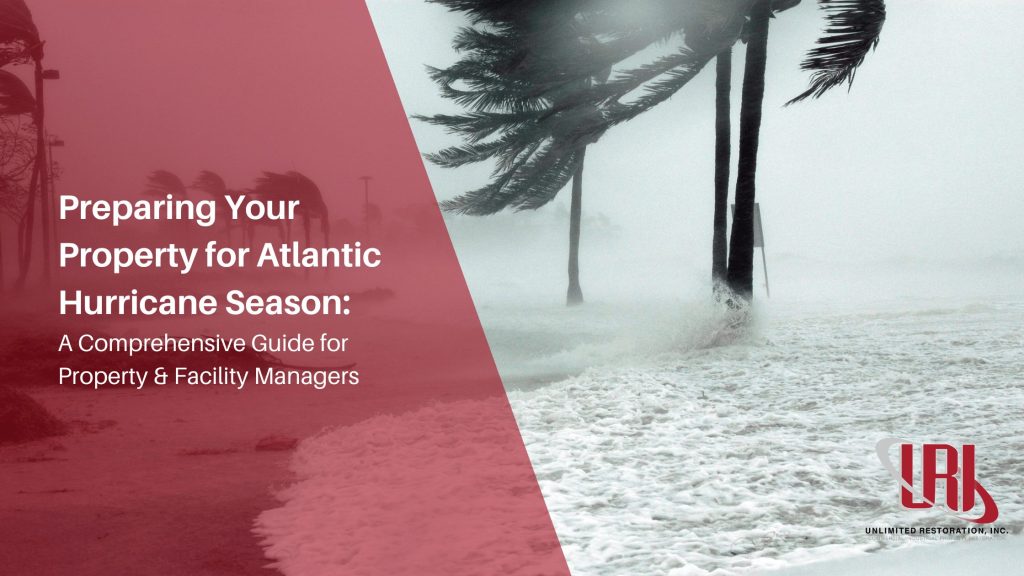
Atlantic hurricane season can pose significant threats to commercial, industrial, and multi-family residential properties located across the East and Gulf Coasts. As a property or facility manager, it is crucial to be well-prepared and take proactive measures to safeguard your assets, ensure the safety of occupants, and minimize potential damage caused by hurricanes. In this blog post, we will outline a comprehensive guide to help property and facility managers effectively prepare their properties for the Atlantic hurricane season.
Stay updated with the latest information regarding hurricane forecasts, warnings, and emergency protocols. Monitor reputable sources such as the National Hurricane Center (NHC) and local meteorological agencies to remain aware of any potential threats. Sign up for local emergency alerts and maintain open communication with local authorities to stay informed throughout the hurricane season.
Create a detailed hurricane preparedness plan specific to your property. This plan should include procedures to be followed before, during, and after a hurricane. Assign responsibilities to staff members, establish communication protocols, and ensure everyone is well-trained and familiar with emergency procedures. Regularly review and update the plan to reflect any changes or lessons learned from previous hurricane seasons.
Did you know that Unlimited Restoration offers a free pre-loss planning tool the URI ERP (Emergency Response Plan) that can put the power of planning ahead into the palm of you and your teams hands? Learn more here.
Conduct a thorough inspection of the property, identifying any vulnerable areas that might be prone to damage during a hurricane. This includes roofs, windows, doors, gutters, drainage systems, and outdoor structures. Address any existing issues promptly and ensure regular maintenance tasks are performed. Trim trees and remove any loose branches or debris that could become potential hazards during high winds.
Secure or store any outdoor furniture, signage, equipment, or loose objects that could be picked up by strong winds and cause damage. Install hurricane shutters or impact-resistant windows to protect against flying debris. Reinforce entry doors and garage doors to withstand hurricane-force winds. If applicable, consider investing in hurricane-rated commercial roll-up doors for warehouses or storage areas.
Ensure that all important data and documents related to the property, such as leases, insurance policies, and maintenance records, are securely backed up and stored off-site. Utilize cloud storage or external hard drives to protect against potential physical damage caused by hurricanes or flooding.
Review your property’s insurance coverage with your insurance agent to ensure it provides adequate protection against hurricane-related damage. Understand the terms, deductibles, and exclusions of your policy. Consider additional coverage options, such as flood insurance, as standard policies often exclude flood-related damages.
Invest in a reliable backup power system, such as a generator or uninterruptible power supply (UPS), to ensure essential services can continue during power outages. Identify critical equipment and systems that require uninterrupted power, such as emergency lighting, elevators, communication systems, and security systems, and ensure they are connected to the backup power source.
Proactively communicate with occupants about the property’s hurricane preparedness plan, evacuation routes, and safety measures. Provide clear instructions on what to do in the event of a hurricane and share important contact information for emergencies. Distribute a hurricane preparedness guide to help residents or employees adequately prepare their personal spaces.
Organize drills and training sessions to familiarize occupants and staff members with evacuation procedures, shelter locations, and safety protocols. These exercises help ensure everyone knows what to do in an emergency and can react swiftly and calmly when faced with a hurricane threat.
In the event of a widespread catastrophic event, resources can become scarce. We recommend vetting and choosing a restoration partner to have at the ready for when the need should arise due to a hurricane, or any disaster that may occur at your property!
Preparing your commercial, industrial, or multi-family residential property for the Atlantic hurricane season is of utmost importance for property and facility managers.By taking proactive measures and implementing a comprehensive hurricane preparedness plan, property and facility managers can effectively minimize potential damage and ensure the safety of all occupants during hurricanes. Remember, being proactive and prepared is the key to successfully navigating the challenges posed by the Atlantic hurricane season. By implementing these measures, property managers can mitigate risks and protect their assets, occupants, and their overall business operations. Stay vigilant, stay prepared, and stay safe during hurricane season.